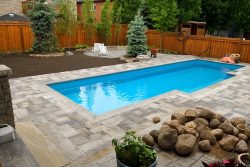Fiberglass Pools vs Concrete Pools: How Do They Compare?
 Fiberglass Pools vs Concrete Pools: How Do They Compare?
Fiberglass Pools vs Concrete Pools: How Do They Compare?
Installing a swimming pool in your backyard can provide endless hours of entertainment and relaxation for you and your family. However, with so many options available, it can be challenging to choose the right type of pool for your needs. Fiberglass and concrete pools are two of the most common options on the market, each with their own unique advantages and disadvantages. In this post, we’ll explore how these two types of pools compare to help you make an informed decision.
Fiberglass Pools
Fiberglass pools are made from a pre-fabricated shell that is manufactured in a factory and then delivered to your home for installation. The fiberglass shell is then lowered into a pre-dug hole, secured with a concrete footing, and backfilled with the surrounding soil. Here are some of the pros and cons of fiberglass pools:
Pros:
1. Quick Installation: Fiberglass pools require less time to install when compared to concrete pools, typically taking between two and four weeks.
2. Easy to Maintain: Fiberglass pools are non-porous and have a smooth gel-coated surface that requires less maintenance and fewer chemicals. This means lower maintenance costs and less time spent on upkeep.
3. Comfortable Surface: The smooth surface of fiberglass pools is comfortable to the touch and less likely to scrape or scratch skin.
4. Safe: The non-porous surface of fiberglass pools means that algae and bacteria are less likely to grow, resulting in a safer swimming environment for you and your family.
5. Energy Efficient: Fiberglass pools are known for their energy efficiency, due to their insulating properties. This means that they require less energy to heat and maintain a comfortable temperature.
Cons:
1. Limited Customization: Fiberglass pools come in pre-fabricated shapes and sizes, meaning that customization options are limited.
2. More Expensive: Despite being quicker to install, fiberglass pools can be more expensive due to the cost of the pre-fabricated shell and the need for cranes to install them.
3. Limited Depth: Fiberglass pools are limited in depth, typically maxing out at around 8 feet.
4. Limited Durability: Fiberglass can be prone to cracking over time and may need to be replaced after 15-20 years.
Concrete Pools
Concrete pools are made by pouring concrete into a pre-dug hole and reinforcing it with steel bars or mesh. The concrete is then shaped, smoothed, and tiled to create your desired finish. Here are some of the pros and cons of concrete pools:
Pros:
1. More Customizable: Concrete pools can be fully customized to your preferences, including shape, size, and depth, making them more versatile than fiberglass pools.
2. Durable: Concrete pools are known for their durability and can last for many years with proper maintenance.
3. Resale Value: A well-maintained concrete pool can increase the value of your home and make it more appealing to potential buyers.
Cons:
1. Longer Installation: Concrete pools can take several months to install, as the process involves pouring and setting the concrete and waiting for it to cure.
2. Higher Maintenance Costs: The plaster surface of concrete pools can be prone to stains and algae buildup, leading to higher maintenance costs and more time spent cleaning.
3. Rough Surface: The rough surface of concrete pools can be tough on skin and swimsuits, leading to scrapes and snags.
4. Higher Chemical Use: Concrete pools require more chemicals to maintain proper water balance since the porous surface allows algae and bacteria to grow more easily.
Conclusion
Both fiberglass and concrete pools have their own unique advantages and disadvantages. When deciding which pool to choose, consider your budget, desired customization level, and the time you’re willing to invest in pool maintenance. Fiberglass pools are generally quicker and easier to install and require less maintenance, while concrete pools can be fully customized and are more durable. In the end, it’s a matter of personal choice and what suits your lifestyle and preferences.
Categorised in: Fiberglass Pools
